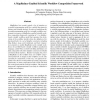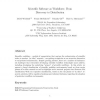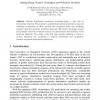132
click to vote
PROCEDIA
2010
14 years 8 months ago
2010
One of the greatest challenges in computational chemistry is the design of enzymes to catalyze non-natural chemical reactions. We focus on harnessing the distributed parallel comp...
143
click to vote
ICWS
2009
IEEE
14 years 11 months ago
2009
IEEE
MapReduce has recently gained a lot of attention as a parallel programming model for scalable data-intensive business and scientific analysis. In order to benefit from this powerf...
SERVICES
2010
15 years 3 months ago
2010
In this paper we propose to achieve a semantic equivalence between a visual- and a script-based workflow development paradigm. We accomplish this by building a script language whi...
159
click to vote
EDBTW
2006
Springer
15 years 5 months ago
2006
Springer
Scientific workflows facilitate automation, reuse, and reproducibility of scientific data management and analysis tasks. Scientific workflows are often modeled as dataflow networks...
128
click to vote
DILS
2006
Springer
15 years 5 months ago
2006
Springer
Steps in scientific workflows often generate collections of results, causing the data flowing through workflows to become increasingly nested. Because conventional workflow compone...
138
click to vote
ICCS
2007
Springer
15 years 6 months ago
2007
Springer
Scientific workflows have gained great momentum in recent years due to their critical roles in e-Science and cyberinfrastructure applications. However, some tasks of a scientific w...
157
click to vote
SAG
2004
Springer
15 years 7 months ago
2004
Springer
Grid workflows can be seen as special scientific workflows involving high performance and/or high throughput computational tasks. Much work in grid workflows has focused on improvi...
118
click to vote
WAIM
2005
Springer
15 years 7 months ago
2005
Springer
Species distribution prediction modeling plays a key role in biodiversity research. We propose to publish both species distribution data and modeling components as Web services and...
101
click to vote
SSDBM
2005
IEEE
15 years 7 months ago
2005
IEEE
The tools used to analyze scientific data are often distinct from those used to archive, retrieve, and query data. A scientific workflow environment, however, allows one to seamles...



